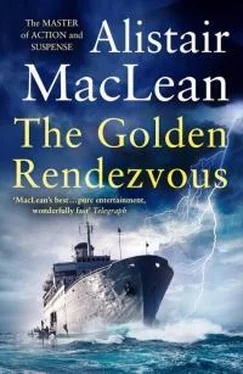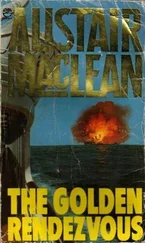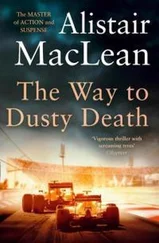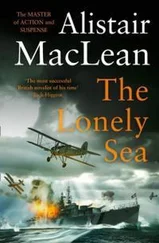Fifteen minutes after noon Carreras appeared again. If his investigations into possible foul play connected with his son’s death had made any progress, he made no mention of it: he did not even refer to the disappearance again. He had the inevitable chart – two of them this time – with him and the noon position of the Campari . Seemingly he’d managed to take a good fix from the sun.
“Our position, our speed, their position, their speed and our respective course. Do we intercept at the point marked ‘X’?”
“I suppose you’ve already worked it out for yourself?”
“I have.”
“We don’t intercept,” I said after a few minutes.
“At our present speed we should arrive at your rendezvous in between eleven and eleven and a half hours. Say midnight. Five hours ahead of schedule.”
“Thank you, Mr. Carter. My own conclusion exactly. The five-hour wait for the Ticonderoga won’t take long in passing.”
I felt a queer sensation in my middle, the phrase about a person’s heart sinking may not be physiologically accurate but it described the feeling perfectly. This would ruin everything, completely destroy what little chance my plan ever had of succeeding. But I knew the consternation did not show in my face.
“Planning on arriving there at midnight and hanging around till the fly walks into your parlour?” I shrugged. “Well, you’re the man who’s making the decisions.”
“What do you mean by that?” he asked sharply.
“Nothing much,” I said indifferently. “It’s just that I would have thought that you would want your crew at the maximum stage of efficiency for trans-shipping the gold when we meet the Fort Ticonderoga .”
“So?”
“So there’s still going to be a heavy sea running in twelve hours’ time. When we stop at the rendezvous, the Campari is going to lie in the trough of the seas and, in the elegant phrase of our times, roll her guts out. I don’t know how many of that crowd of landlubbers you have along with you were sea-sick last night, but I’ll bet there will be twice as many tonight. And don’t think our stabilisers are going to save you – they depend upon the factor of the ship’s speed for their effect.”
“A well-taken point,” he agreed calmly. “I shall reduce speed, aim at being there about 4 a.m.” He looked at me with sudden speculation. “Remarkably co-operative, full of helpful suggestions. Curiously out of the estimate I had formed of your character.”
“Which only goes to show how wrong your estimate is, my friend. Common sense and self-interest explain it. I want to get into a proper hospital as soon as possible – the prospect of going through life with one leg doesn’t appeal. The sooner I see passengers, crew and myself transferred aboard the Ticonderoga the happier I’ll be. Only a fool kicks against the pricks: I know a fait accompli when I see one. You are going to transfer us all aboard the Ticonderoga , aren’t you, Carreras?”
“I shall have no further use for any member of the Campari’ s crew, far less for the passengers.” He smiled thinly. “Captain Teach and Blackbeard are not my ideals, Mr. Carter. I should like to be remembered as a humane pirate. You have my word that all of you will be transferred in safety and unharmed.” The last sentence had the ring of truth and sincerity, because it was true and sincere. It was the truth, but it wasn’t of course, the whole truth: he’d left out the bit about our being blown out of existence half an hour later.
About seven o’clock in the evening Susan Beresford returned and Marston left, under guard, to dispense pills and soothing words to the passengers in the drawing-room, many of whom were, after twenty-four hours of continuously heavy weather, understandably not feeling at their best.
Susan looked tired and pale, no doubt the emotional and physical suffering of the previous night together with the pain from her broken arm accounted for that, but I had to admit for the first time, in an unbiased fashion, that she also looked very lovely: I’d never before realised that auburn hair and green eyes were a combination that couldn’t be matched, but possibly that was because I’d never before seen an auburn-haired girl with green eyes.
She was also tense, nervous and jumpy as a cat. Unlike old Doc Marston and myself, she’d never have made it in the Method school.
She came softly to my bedside – Bullen was still under sedation and MacDonald either asleep or dozing – and sat down on a chair. After I’d asked her how she was and how the passengers were, and she’d asked me how I was and I’d told her and she hadn’t believed me, she said suddenly: “Johnny, if everything goes all right, will you get another ship?”
“I don’t follow.”
“Well,” she said impatiently, “if the Campari’ s blown up and we get away or if we’re saved some other way, will you–”
“I see. I suppose I would. Blue Mail has plenty of ships and I’m supposed to be the senior chief officer.”
“You’ll like that? Getting back to sea again?” This was a crazy conversation, but she was only whistling in the dark. I said: “I don’t think I’ll be back to sea again, somehow.”
“Giving in?”
“Giving up. A different thing altogether. I don’t want to spend the rest of my life catering to the whims of wealthy passengers. I don’t include the Beresford family, father, mother – or daughter.”
She smiled at this, going into this weird routine of melting the green in her eyes, the kind of smile that could have a very serious effect on the constitution of a sick man like myself, so I looked away and went on: “I’m a pretty fair mechanic and I’ve a bit of cash put away. There’s a very nice flourishing little garage down in Kent that I can take over any time I want. And Archie MacDonald there is an outstanding mechanic. We’d make a pretty fair team, I think?”
“Have you asked him yet?”
“What chance have I had?” I said irritably. “I’ve only just thought about it.”
“You’re pretty good friends, aren’t you?”
“Good enough? What’s that got to do with anything?”
“Nothing, just nothing. Funny, that’s all. There’s the bo’sun, he’ll never walk properly again, nobody will want him at sea any more, he’s probably got no qualifications for any decent job on land – especially with that leg – and all of a sudden Chief Officer Carter gets tired of the sea and decides–”
“It’s not that way at all,” I interrupted.
“I’m not very clever. But you don’t have to worry about him, anyway. Daddy told me this afternoon that he’s got a good job for him.”
“Oh?” I took a chance and looked at her eyes again. “What kind of job?”
“A storeman.”
“A storeman.” I know I sounded disappointed, but I’d have sounded ten times as disappointed if I had been able to take all this seriously, if I’d been able to share her belief that there was a future. “Well, it’s kind of him. Nothing wrong with a storeman, but I just don’t see Archie MacDonald as one, that’s all. Especially not in America.”
“Will you listen?” she asked sweetly. A touch of the Miss Beresford that was.
“I’m listening.”
“You’ve heard that Daddy’s building a big refinery in the West of Scotland? Storage tanks, own port to take goodness knows how many tankers?”
“I’ve heard.”
“Well, that’s the place. Stores for the oil-port and the refinery – millions and millions of dollars of stores, Daddy says, with goodness knows how many men to look after them. And your friend in charge – and with a dream house attached.”
“That is a different proposition altogether. I think it sounds wonderful, Susan, just wonderful. It’s terribly kind of you.”
Читать дальше
Конец ознакомительного отрывка
Купить книгу












